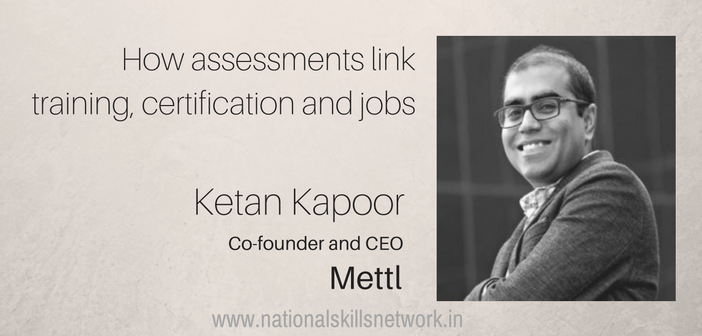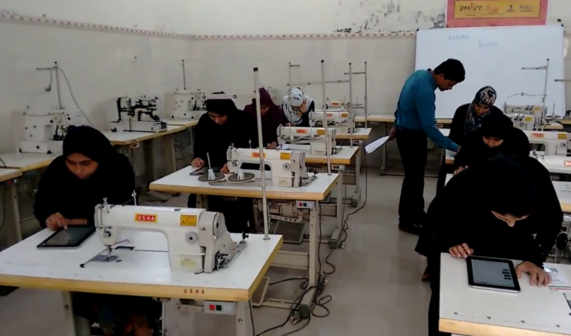Assessment and certification is a very important step in the process of skill based training. Now with more initiatives coming up in the assessment and certification arena, technology has become a great enabler for RPL and post training assessments. In this Skill Story, Ketan Kapoor, CEO, Mettl, an online assessment portal for training and placements tells us more about the significance of technology and the role of assessments in training and employment.
Mettl’s contribution is immense in the skill sector and it could be divided into four key segments – bringing in the technology, credibility, transparency and auditability to assessments. On the whole, we are extremely data driven, backing most of our assessments with expert insights, analytics and customizable reports. We have a strong in-house content development team that curates high quality questions and assessments on a daily basis.
We involve Subject Matter Experts (SMEs) at every stage of the process for improvement. Our technology platform and assessments are used by over 1200 corporates across 40+ countries for their recruitment needs. This by itself is a testament to the robustness of our platform, the quality and credibility of assessments, and our overall process. We work with 25+ Sector Skill Councils (SSCs), from Agriculture SSC to Tourism & Hospitality SSC, and more.
 Mettl’s partnership with various SSCs and training partners
Mettl’s partnership with various SSCs and training partners
At one level, we have standardized processes for affiliation. However, there are some procedures unique from one SSC to the other. Simply put, each SSC caters to a different sector; ergo the nuances of that specific sector define the processes for the SSC. One of the challenges we faced with a couple of SSCs though, is high affiliation fee. At Mettl, we have zero alignment with Training Partners (TP).We conduct assessments on candidates post- training and the batches that are handed over to us.
The SSCs ensures this delicate alignment. We make it our responsibility to make sure that our assessments are in line with everything highlighted in the assessment criteria of a particular QP. This is again validated by the SSCs of respective industries. The same is expected of Training Partners, that is to align their training to the NOS/QP framework.
Recognition of Prior Learning (RPL) and types of assessments
We are into RPL as well. And to start it off, I’d like to define formative and summative assessments. One is conducted while training in regular intervals, and the other is an end of training test; in that order. Now, RPL is also a type of assessment, but one in which there is greater emphasis on viva and practical efforts than normal. It evaluates skill acquired through work experience. Again, the focus is more on understanding the gap in skill to train working professionals, thereby bringing them up to speed with the desired or standard set of competencies.
Baseline and exit-gate assessments could help us understand RPL better here. The first is conducted before commencement of training to understand the candidate’s current level of skill. This helps the TP develop an effective Bridge Training program. Exit-gate assessment, on the other hand, is an end of training assessment required for certification. It helps in the impact evaluation of training conducted.
Role of technology in assessments
Our online proctoring tool is trained to detect suspicious behaviour, track movements of the eye, multiple faces on screen and more. There are also several security measures to check for authenticity of the candidate – government issued ID card screening, biometric scans.

It’s simply well-rounded and better than the traditional form of assessments, especially when you weigh in the elimination of logistical hassles. The live feed from the proctored tests are also recorded for future review, ensuring great levels of transparency.
There’s also our offline proctored assessments for areas in India without access to the internet, where an android tablet’s front camera is used to record tests to be reviewed later. Quite simply, technology continues to evolve and make several aspects of our life easy.
Linking skills with jobs
There are two aspects to this now; in skilling and for corporates. Our assessment is designed largely in accordance to the NSQF framework, the capacities defined that ultimately predicts outcomes in terms of performance in job.
With corporates, there’s a benchmarking exercise in place. Inputs are also taken from the company, especially with respect to the competencies they want to test the candidates in. This is usually mapped to our own expert framework, which is then a model to design and deliver assessments. Results are again validated by executives from the company.
There is a lot to explore in this facet – namely Cognitive and Psychometric assessments, among a host of situational judgment and case study simulated tests, to name a few.
On the flip side, we believe Psychometric Assessments identifies candidate synergy with an organization, ensuring that they hire not just what’s best on paper, but what’s best for them. We know and believe that no one size fits all, which is why we tailor our solutions to each problem.
Technology is ever progressive and aggressive with its growth. It’s like time, riding a wave of its own, waiting for none. As the world is swept forward with its ferocity, it’s only natural that assessments should follow. We begin to see e-Learning platforms, assessment technology could also bring the same convenience and efficiency. This, to both the test giver and test taker.












